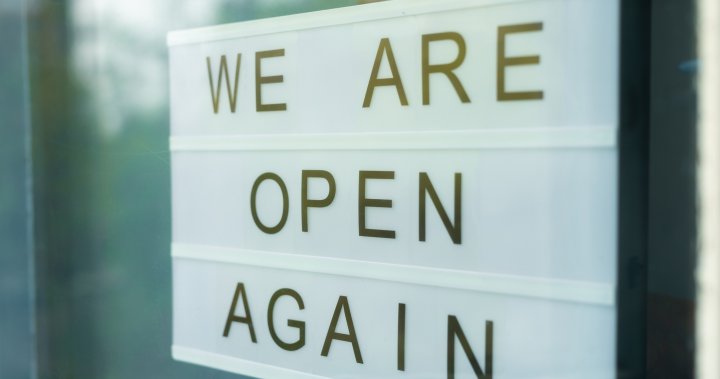As the COVID-19 pandemic continues, Canadian small businesses have accumulated a collective debt of $ 135 billion due to the health emergency, according to estimates by the Canadian Federation of Independent Business (CFIB).
Read more:
Anand won’t say if Canada has waived right to sue over vaccine delays
The group, which lobbies for small entrepreneurs, says seven in ten small business owners have had to borrow money due to the pandemic, with average debt now close to $ 170,000.
“The second wave and the restrictions that go with it are putting the brakes on an already slow recovery for small businesses,” said Laura Jones, CFIB executive vice-president, in a statement.
While many businesses have experienced some reprieve over the summer, with sales picking up in the warmer months, Canada’s small business debt has since seen “a significant increase” since the previous estimate of the CFIB of $ 117 billion as of July 2020.

And while just over half of businesses are now fully open, only 25% report normal sales levels, a trend the report calls “concerning.”
In Vaughn, Ont., Elizabeth Clark says her company, Chair Decor, which provides linens for venues and professional event planners, has been forced into debt of more than $ 100,000 due to the lockdowns and restrictions related to COVID-19.
The debt comes from the Canada Emergency Business Account (CEBA) program and a loan from the Business Development Bank of Canada, Clark says.
Read more:
COVID-19 emergency benefits including CRB, sick pay, to be extended
The CEBA, which offers businesses interest-free loans of up to $ 60,000, of which a maximum of $ 20,000 qualifies for a rebate, is by far the most widely used government support program for small businesses, with nearly six in 10 entrepreneurs say they are appealing, according to the CFIB.
Clark, who has run Chair Decor for five years, also relied for a time on the federal wage subsidy, among other relief measures. But despite this, she was forced to lay off all of her staff just before the December vacation.
Even so, his business is still burning between $ 12,000 and $ 15,000 a month while his warehouse is empty, Clark says.

She hopes that what she has borrowed so far will be enough to foot the bill until business picks up, but the massive debt load is sure to delay her business recovery, she says.
Under normal circumstances, small businesses typically go into debt to pay for inventory or equipment or to finance growth. With the debt linked to COVID-19, however, small businesses have borrowed just to keep the lights on, she says.
Read more:
Retail sales fell 3.4% in December, marking the biggest drop since April
“We have no idea how long it will take us to pay off this debt. So how are we going to account for the future growth of our business when all of our profits are literally going to pay off that debt? “
Small businesses in the hospitality, arts and recreation, and social services sectors are more likely to take on debt, as companies in these sectors tend to be public-facing, have limited ability to adapt to work at home. distance and are unlikely to be considered essential. , notes the CFIB report.
Source: CFIB.
Source: CFIB
Overall, just over three-quarters of small businesses that have taken on debt expect it will take more than a year to pay it off, with 11% of this group worrying that they will not be in debt. able to repay at all.

The survey results come from CFIB’s Your Voice – February 2021 survey, which was conducted online by 3,554 small business owners in Canada from February 4 to 8, 2021. For comparison purposes, a probability sample with the same number of respondents would have a margin of error of +/- 1.6 percent, or 19 times out of 20. The results of this survey are preliminary at the time of writing.The estimate of total debt related to COVID-19 for Canadian small businesses is based on the CFIB survey results and the number of businesses from Statistics Canada for December 2020.
© 2021 Global News, a division of Corus Entertainment Inc.
![]()
![]()
![]()
![]()

“Evil alcohol lover. Twitter junkie. Future teen idol. Reader. Food aficionado. Introvert. Coffee evangelist. Typical bacon enthusiast.”
